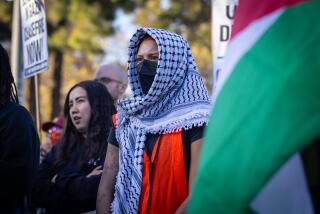Pi Kappa Bell Caper Takes Its Toll : CSUN: Theft of historic object is fraternity’s latest black mark, coming on top of low grades and an alcohol violation. Group says new recruiting sanction could mean its demise.
NORTHRIDGE — When four fraternity pledges from Cal State Northridge stole the historic marker bell from the San Fernando Mission in a supposed prank, the episode had more than a familiar ring to it for campus officials.
While youthful high jinks have long been a part of college life, university officials were hardly amused. The culprits turned out to be associated with the Pi Kappa Alpha fraternity, CSUN’s largest, and the bell caper is the latest in a series of discipline problems that one administrator called unrivaled among the 11 fraternities on campus.
Apart from the bell theft, the fraternity already was in trouble because of pledges’ poor grades during the past year; was sanctioned last fall over an alcohol and party episode, and was suspended by its own national organization four years ago over a series of other problems.
Additionally, the reputation of the national Pi Kappa Alpha organization, one of the country’s 10 largest fraternities, has been marred by alleged gang rapes by its members at three universities during the mid- to late 1980s.
At CSUN, the campus fraternity system’s 10-member judicial board on Feb. 20 imposed on the fraternity a one-year ban on recruiting, holding parties and participating in other campus events.
The fraternity, arguing that the ruling could be its death knell, said it plans to appeal this week.
To CSUN officials, the bell incident is a sign the local Pi Kappa Alpha group’s rebirth in the early 1990s did not alter its troubled course. To the students who lead the group, known as the Pikes, and their alumni advisers, the episode is an isolated incident that has led to a massive overreaction.
And to other fraternity and sorority members on the Northridge campus, the entire dispute amounts to an unwanted public-relations black eye for CSUN’s sparsely populated Greek system, which students insist really is more devoted to community service than “Animal House” antics.
“I don’t think the community individualizes us--the Pikes versus the Greek system. I think they view it as a negative mark on the whole system,” said Dave Baker, the student adviser to the panel of 10 student fraternity members who sanctioned the Pi Kappa Alpha group last month.
While other CSUN fraternities have not been without their difficulties over the years, Tom Piernik, the university’s director of student development and international programs, said the Pi Kappa Alpha group has had more problems and seems incapable of keeping its members in line.
“The current leadership has demonstrated an inability to come to terms with the seriousness of the problems and how to deal with them,” Piernik said. “I feel I have done this repeatedly with this group. We have advised them and counseled them as best we can. But we can’t do it for them.
“This is not just about four people making a mistake. It’s about a fraternity that has not indoctrinated its members in what fraternities are supposed to be about,” he added, saying the group’s problems have been “not normal, not routine and not expected.”
But leaders of the fraternity, which began on the Northridge campus in 1967, argue that they seem to have more problems simply because they are the largest fraternity at CSUN, with about 65 student members, and thus draw more scrutiny from both university officials and fraternity rivals.
“Is it happening worse with us? I don’t think so,” said Mario Menanno, student president of the CSUN chapter. “When you bring so many men in at one time (as new pledges), what happens--growth pains,” Menanno said, arguing that other fraternities have “numerous problems every semester.”
With declining student enrollments at CSUN in recent years, the campus’ status as a commuter-oriented school and the lack of a traditional Greek Row, a grouping of fraternity and sorority houses, some students believe the Greek system is on the decline--and the Pi Kappa Alpha debacle won’t help. CSUN has about 430 fraternity members among the 11 groups, plus six sororities, a somewhat smaller presence than other large campuses.
The four Pi Kappa pledges took the 1909-vintage bell and the 12-foot staff it was perched on from the street in front of the mission on Jan. 4. Fraternity members claim they discovered the theft Jan. 22 and returned the bell anonymously by Jan. 26, about the time the university began an inquiry. The fraternity quickly acknowledged its pledges were responsible.
CSUN Assistant Vice President for Student Life William Watkins, calling the incident more of a pledging prank than a crime, said he decided against taking disciplinary action against the four pledges as individuals even though the student fraternity panel had recommended it.
If the fraternity files its appeal by the deadline at the end of this coming week, it would be heard by another 10-student panel of fraternity leaders. Any change from the original sanctions would require an unlikely two-thirds vote. Beyond that, the fraternity could file a final appeal with Watkins.
Members say their biggest complaint is that the one-year ban on recruiting will prevent the fraternity from gaining new members this spring and all of the following school year, which might help reform the group. Without that, the group faces a slow death, they argue.
The fraternity has been down the appeal route before. Last fall, after being accused of holding a midweek party at a bar and allegedly serving alcohol to an underage student, the fraternity unsuccessfully fought a semester-long ban on parties that the student disciplinary panel imposed.
According to interviews with university officials and fraternity members, the university this spring imposed an even broader range of sanctions against the fraternity when its pledge class fell below a 2.2 overall grade point average (just above C-level work) for a second consecutive semester.
And Ray Orians, executive vice president of the Memphis-based Pi Kappa Alpha International Fraternity, which oversees its 201 university chapters with about 14,000 student members, confirmed that his group suspended the CSUN chapter’s charter in 1990-91, leaving the group disbanded till 1992.
University officials and students said the suspension stemmed from several incidents, including one in which an intoxicated female student was injured falling off a moving vehicle at an off-campus party thrown by fraternity members, and an on-campus stunt by fraternity members that was considered ethnically offensive.
In earlier years, according to Piernik and confirmed by fraternity members, the CSUN group got into trouble with the university for extensively damaging a rented condominium during a winter-break trip to Mammoth in 1986. “They trashed the place,” Piernik said.
At the national level, the alleged rape cases involving Pi Kappa Alpha members--at San Diego State University in 1985, and at Florida State University and Florida’s Stetson University in 1988--led to the demise of the fraternity’s chapters at all three of those campuses.
Orians said only students from Florida State were prosecuted from among the three cases. And although one women’s group leader in Florida publicly suggested the attacks may have been the result of a competition among fraternity chapters, Orians said his group found no evidence of that.
More to Read
Sign up for Essential California
The most important California stories and recommendations in your inbox every morning.
You may occasionally receive promotional content from the Los Angeles Times.










